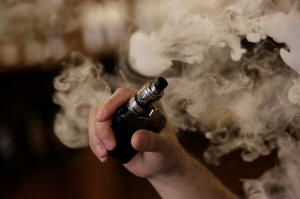Nicotine-like chemicals in U.S. vapes may be more potent than nicotine,
FDA says
 Send a link to a friend
Send a link to a friend
 [May 29, 2024]
By Emma Rumney [May 29, 2024]
By Emma Rumney
LONDON (Reuters) - Nicotine alternatives used in vapes being launched in
the U.S. and abroad, such as 6-methyl nicotine, may be more potent and
addictive than nicotine itself, though the scientific data remains
incomplete, according to the U.S. Food and Drug Administration (FDA) and
independent researchers.
The synthetic substances - which have a chemical structure similar to
that of nicotine - are not subject to U.S. tobacco and vaping
regulations that are designed to control traditional nicotine, a highly
addictive drug.
That means manufacturers can sell vapes containing synthetic nicotine
analogues such as 6-methyl nicotine in the United States without seeking
authorization from the FDA - a process that can be costly,
time-consuming and is often unsuccessful.
Big tobacco firms like Altria Group and British American Tobacco have
already lost substantial U.S. sales to an influx of disposable vapes
containing traditional nicotine that are being illegally sold without
FDA authorization.
Altria, the maker of Marlboro cigarettes in the United States,
highlighted the emerging use of 6-methyl nicotine in vapes in an April 5
letter to the FDA, according to a copy of its correspondence posted on
its website. The letter urged the FDA to tackle the substantial black
market for nicotine-containing vapes.
"This problem is now spreading," Altria said in the letter, flagging the
emergence of nicotine analogues. It cited SPREE BAR, a vape launched in
October by Charlie's Holdings Inc that uses 6-methyl nicotine.
The FDA declined to comment on correspondence with individual firms.

In response to Reuters' questions about 6-methyl nicotine and other
nicotine alternatives, the FDA said in a statement: "Although more
research is needed, some emerging data show these nicotine analogs may
be more potent than nicotine – which is already highly addictive, can
alter adolescent brain development and have long-term effects on youth's
attention, learning and memory."
Traditional nicotine found in many vapes and pouches is extracted from
tobacco leaves. 6-methyl nicotine, in contrast, is made entirely in the
lab using chemicals.
The FDA said it was considering the use of such synthetic compounds from
an "agency-wide perspective" and would use all of its resources to
protect youth from products that may harm their health. As well as
tobacco products, the FDA also regulates drugs, foods, cosmetics and
more to ensure safety and efficacy.
"The FDA is a data-driven agency, and we're in the process of reviewing
the available data to inform potential actions in this space," it said
in response to Reuters' questions.
Three academic researchers told the news agency that current studies of
6-methyl nicotine are too limited to draw definite conclusions on the
health impact or to what degree it is addictive.
Imad Damaj, a professor in the Department of Pharmacology and Toxicology
at Virginia Commonwealth University, said his research showed 6-methyl
nicotine may be more potent than nicotine, but more extensive tests were
needed to say what impact it has on humans.
The limitations of existing research included that some papers were
industry funded, while others focused on the short-term impact on
animals or cells and were insufficient to understand 6-methyl nicotine's
effects on human bodies, the researchers said.
Charlie's Holdings calls the 6-methyl nicotine solution used in SPREE
BAR Metatine. SPREE BAR's website says Metatine "may have a toxicity
profile similar to nicotine".

SPREE BAR promises users 6,000 puffs from each device and offers fruity
flavors including "blue razz ice" and "creamy melon", according to its
website.
The FDA has yet to approve any flavored vape using traditional nicotine
for sale in the United States, saying companies have not been able to
show that the health benefits they offer to smokers outweigh the known
risks to young people, who may be more attracted by the flavors.
Charlie's Holdings co-founder Ryan Stump told Reuters that the company
only targets adults, adding that flavors played an important role in its
mission to help smokers quit cigarettes.
[to top of second column]
|

A man holds an electronic cigarette as he vapes at a Vape Shop in
Monterrey, Mexico February 1, 2019. Picture taken February 1, 2019.
FREUTERS/Daniel Becerril/ File Photo
 Stump said Charlie's Holdings
respects and abides by laws in every market where it operates. He
acknowledged that more research is needed on 6-methyl nicotine,
adding that the company dilutes it in its products.
TARGETING INTERNATIONAL MARKETS
Anes Saleh sells SPREE BAR in his vape shop in Denver, Colorado,
called Sultan Smoke. He said he has some customers who only buy
Spree Bar instead of a nicotine vape and he hasn't had any negative
feedback on the product.
"The only... protest I would hear about people not wanting to try
this is that they don't know what Metatine is or does," he said.
Stump said that Charlie's Holdings is working on new varieties of
SPREE BAR and new products using 6-methyl nicotine. It will launch
SPREE BAR internationally this year. He declined to say where.
The company buys the 6-methyl nicotine solution used in SPREE BAR
from another U.S. firm, Novel Compounds, according to Novel
Compounds' founder Samuel Benaim.
Novel Compounds imports 6-methyl nicotine from overseas and alters
it to make it easier for manufacturers like Charlie's Holdings to
use in their products. It sells this solution under the trade name
imotine.
Tests commissioned by Novel Compounds have found 6-methyl nicotine
to be no more harmful than nicotine, Benaim said. But he also said
that more research was needed into the chemical.
Benaim added that Novel Compounds had received legal advice that its
product is not classified as a tobacco product or drug in the United
States. The company is committed to legal compliance, he said.
MORE POTENT THAN NICOTINE?
Sven Jordt, a professor at Duke University, who has authored papers
on products like SPREE BAR, said 6-methyl nicotine could me more
addictive and toxic than its traditional cousin.
"Do we want to have such a chemical as a recreational product,
available to anyone?," he asked. "That's really questionable."
Neither Jordt nor Damaj - the professor at Virginia Commonwealth
University - have received funding from tobacco or vape makers.
As well as the United States, Novel Compounds also sells its
6-methyl nicotine solution around the world, including in the United
Kingdom, Indonesia, India and Japan.

Another company, Aroma King, sells 6-methyl nicotine in the United
Kingdom in pouches, which users insert under the lip to get a buzz.
The pouches are sold in cans emblazoned with graphics of gorillas in
suits and sunglasses.
It said in a February blog post that its 6-methyl nicotine products
were "less toxic", "less harmful", and "less addictive" than regular
nicotine products.
In a statement to Reuters, Aroma King cited existing research, its
own toxicology and other tests and its supplier, which classifies
6-methyl nicotine as less toxic under the European Union's
Classification, Labeling and Packaging of Substances and Mixtures (CLP)
Regulation.
Aroma King said 6-methyl nicotine was self-classified by its
supplier. It declined to say who supplies it with the chemical.
Four Chinese companies hold patents in China related to the
production of 6-methyl nicotine, including Zinwi Biotech, a company
that makes the liquid used in vapes.
Zinwi Biotech confirmed it is researching 6-methyl nicotine but did
not answer further questions, including on whether it has sold any
6-methyl nicotine so far. Reuters was unable to find contact details
for the other firms.
(Reporting by Emma Rumney; Editing by Matt Scuffham and Daniel
Flynn)
[© 2024 Thomson Reuters. All rights reserved.]This material may not be published,
broadcast, rewritten or redistributed.
Thompson Reuters is solely responsible for this content.
 |